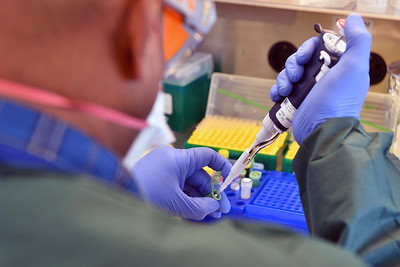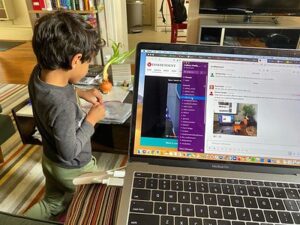The current COVID-19 surge is making higher education institutions rethink their in-person learning plans for the coming semester. Omicron’s hyper-transmissibility is rapidly draining the nation’s COVID-19 testing supplies just as students are returning to campus. To slow the COVID-19 surge among staff and students, college campuses are reverting to virtual learning. Further, emerging studies show that vaccination alone – without a booster shot – does not provide sufficient protection against the omicron variant.
Currently in Michigan, people may not be able to secure appointments for testing or must wait for hours in line. Those who can find testing may wait up to 5 days to get PCR test results. Pharmacies that stock rapid tests have limited purchasers to no more than four test kits per visit.
COVID-19 hospitalizations in Michigan are at record high levels, having peaked on December 10, with 4,561. As of December 26, more than 20% of all PCR COVID-19 tests taken in Michigan returned a positive result. Washtenaw County is one of nine Michigan counties to record a 7-day case average that increased by more than 5%.
The Centers for Disease Control and Prevention have indicated that they expect the current COVID-19 surge to last for 4-6 weeks. While most COVID-positive individuals are unvaccinated, the CDC expects a growing number of positive cases among fully vaccinated people.
COVID-19 surge may be tiresome, but students deserve to know the plan
For a growing number of higher education institutions, moving to virtual learning isn’t easy, but it is logical. U of M has stated that it intends to begin the Winter semester entirely in-person on January 5. The university also indicated that it would require all staff and students to provide proof that they’ve received a COVID-19 booster. EMU has stated that it will resume classes as scheduled on January 10, but will deliver the first week of instruction entirely remotely. Michigan State University and Wayne State University have indicated that they will resume classes on January 10 as planned but will deliver remote-only instruction until February 1.
Reverting to remote learning for the first few weeks of the semester makes sense. As of December 29, Michigan Medicine was at 71% occupancy with 118 COVID-19 patients. St. Joseph Mercy Hospital is at 99% occupancy with 115 COVID-19 patients. These occupancy rates reflect unplanned hospitalizations since neither facility schedules elective procedures during the last week of the year. Currently, our region (which includes Wayne, Washtenaw and Monroe counties) has the highest number of both adult and pediatric COVID-19 patients, and the highest number of COVID-19 patients on ventilators. It also has the second-highest number of COVID-19-related emergency room visits.
The Washtenaw Community College administration should announce its learning delivery plan for the Winter semester immediately, considering the severity of the area’s COVID-19 surge. Waiting until the last minute to indicate the College’s plan serves no one.
Photo Credit: IAEA Imagebank , via Flickr





